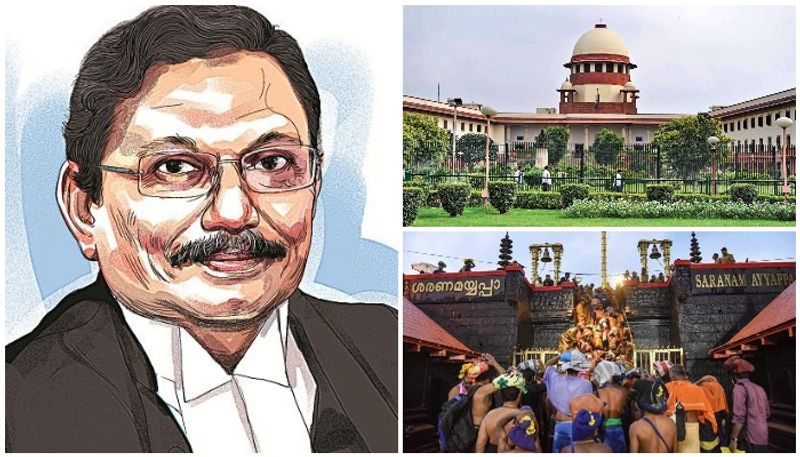Sabarimala row: Larger bench to hear pleas after 3 weeks
The Supreme Court on Monday clarified that it will not hear the review petitions in the Sabarimala temple case. It, however, added that it would consider the issues that were raised by the previous five-judge bench on November 14 last year.
| Published : Jan 13 2020, 04:30 PM
2 Min read
Share this Photo Gallery
- FB
- TW
- Linkdin
17
)
The Supreme Court on January 13 asked four senior lawyers to convene a meeting for deciding issues to be taken up by it in the Sabarimala reference case.
The Supreme Court on January 13 asked four senior lawyers to convene a meeting for deciding issues to be taken up by it in the Sabarimala reference case.
27
The court also said that its Secretary-General would coordinate with lawyers in reframing or adding issues to be dealt with by it. It also fixed pleas regarding discrimination against women in various religions for hearing after three weeks.
The court also said that its Secretary-General would coordinate with lawyers in reframing or adding issues to be dealt with by it. It also fixed pleas regarding discrimination against women in various religions for hearing after three weeks.
37
The nine-judge Constitution bench of the Supreme Court headed by Chief Justice SA Bobde said that it would only hear the questions referred to in the review order passed by it in November last year in the Sabarimala temple case. The other judges on the bench are Justices R Banumathi, Ashok Bhushan, Mohan M Shantanagoudar, S Abdul Nazeer, R Subhash Reddy, L Nageswara Rao, BR Gavai and Surya Kant.
The nine-judge Constitution bench of the Supreme Court headed by Chief Justice SA Bobde said that it would only hear the questions referred to in the review order passed by it in November last year in the Sabarimala temple case. The other judges on the bench are Justices R Banumathi, Ashok Bhushan, Mohan M Shantanagoudar, S Abdul Nazeer, R Subhash Reddy, L Nageswara Rao, BR Gavai and Surya Kant.
47
There are more than 50 review petitions challenging the judgment of the top court, allowing the entry of women of all ages in the Sabarimala temple in Kerala. All the petitions are pending before the apex court for final disposal.
There are more than 50 review petitions challenging the judgment of the top court, allowing the entry of women of all ages in the Sabarimala temple in Kerala. All the petitions are pending before the apex court for final disposal.
57
Two other judges, Justices RF Nariman and DY Chandrachud, who ruled in favour of the entry of girls and women in the age group of 10-50 years in Sabarimala temple, are not part of the new bench. Justice Indu Malhotra was the sole dissenting and only woman judge in the bench which ruled that women are allowed to enter the shrine is also not a part of the new bench.
Two other judges, Justices RF Nariman and DY Chandrachud, who ruled in favour of the entry of girls and women in the age group of 10-50 years in Sabarimala temple, are not part of the new bench. Justice Indu Malhotra was the sole dissenting and only woman judge in the bench which ruled that women are allowed to enter the shrine is also not a part of the new bench.
67
The Supreme Court on December 13, 2020 had said that its 2018 order on Sabarimala temple issue was "not final" as the matter is pending before a seven-judge bench, which, it had said, will be constituted soon.
The Supreme Court on December 13, 2020 had said that its 2018 order on Sabarimala temple issue was "not final" as the matter is pending before a seven-judge bench, which, it had said, will be constituted soon.
77
In 2018, the apex court had allowed girls and women of all age groups to visit the Lord Ayyappa temple at Sabarimala in Kerala, following which a batch of review petitions was filed. Allowing their review petitions, the court had on November 14 referred the matter to a larger bench.
In 2018, the apex court had allowed girls and women of all age groups to visit the Lord Ayyappa temple at Sabarimala in Kerala, following which a batch of review petitions was filed. Allowing their review petitions, the court had on November 14 referred the matter to a larger bench.
